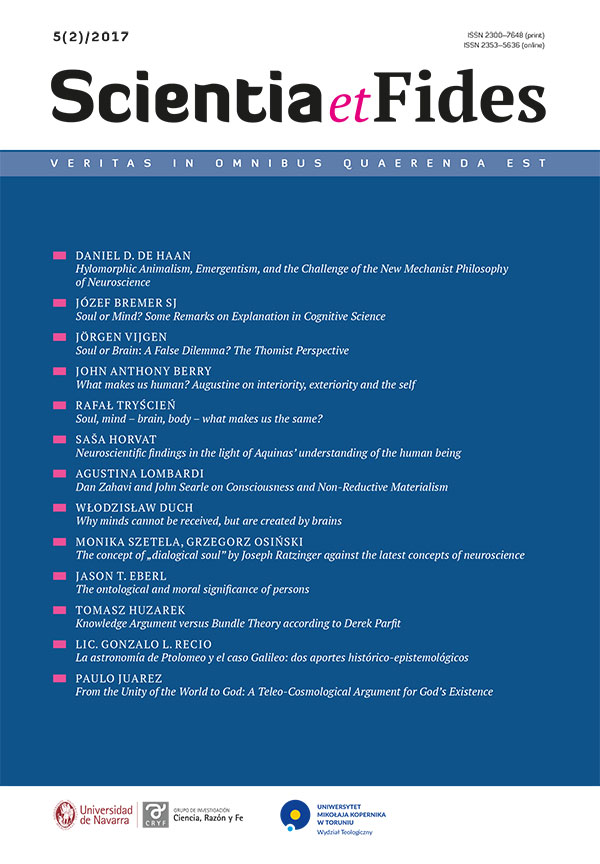Soul, mind – brain, body – what makes us the same?
Keywords
personal identity, soul, complex view, simple viewAbstract
The question whether I am the same person at different moments has brought many difficulties for a long time. The problem with identity of things through time was already known in the ancient times especially when Plutarch asked whether a ship of Theseus with exchanged elements is still the same ship as before renovation. Today, we continue these considerations asking, for instance, if things, apart from their physical parts, also have temporal parts. The number of the proposed solutions to the problem of identity and identity of persons at different times resembles wandering in a dark room with a scarf on your eyes. As a result, rather than coming closer to the light switch, we find concepts which suggest that personal identity is not important, or what is important is psychological continuity or identity which is only a matter of degree. So I can be the same person as I was in some part, in some degree. It sounds like a constitution person who likes darkness and does not need light anymore. Unfortunately, first of all, we still use successfully the concept of identity in an ordinary language, and what is more, the abandonment of the notion of personal identity results in a greater number of absurdities, so in consequence, we still do not have an idea how to treat personal identity.
References
Ayer, A.J. 1956. The Problem of Knowledge. Cited by: Ayer, A.J. 1965. Problem poznania. Traslation E. Koning-Chwedeńczuk. Warszawa: Wydawnictwo Naukowe PWN.
Baker, L. R. 2000. Persons and Bodies A Constitution View, Cambridge University Press.
Baker, L. R. 2013. "Can Subjectivity be Naturalized?" Metodo. International Studies in Phenomenology and Philosophy, Vol. 1, n. 2.
Baker, Lynne Rudder. 2012. "Personal identity: a not-so-simple simple view." In Personal identity: Complex or Simple? Edited by George Gasser and Matthias Stefan, 179–191. Cambridge University Press.
Bremer, J. 2007. Osoba – fikcja czy rzeczywistość? Tożsamość i jedność Ja w świetle badań neurologicznych. Kraków: Wydawnictwo Aureus.
Butler, J. 1975. "Of personal identity." In Personal Identity. Perry, J. Berkeley, Los Angeles, London: Berkeley, Los Angeles, London: University of California Press.
Coleman, S. 2000. "Thought experiments and personal identity." Philosophical Studies 98: 53–69. Netherlands: Kluwer Academic Publishers.
Dennet, D. 2013. Intuition Pumps and Other Tools for Thinking. Cited by: Dennnet D. 2015. Dźwignie wyobraźni i inne narzędzia do myślenia. Translation Kurek Ł. Kraków: Copernicus Center Press.
Garret, B. 1998. Personal identity and self-consciousness. London and New York: Routledge.
Grygianiec, M. 2007. Identyczność i trwanie. Studium ontologiczne. Warszawa: Wydawnictwo Naukowe Semper.
Locke, J. 1689. An Essay Concerning Human Understanding. Cited by: Locke, J. 1955. Rozważania dotyczące rozumy ludzkiego. T. 1. Translation B. J. Gawecki. Warszawa: Wydawnictwo Naukowe PWN.
Locke, J. 1964. "The Identity of the Man and of the Person." In Mind and Death, edited by A. Flew, 155–163. London: The Macmillan Company, New York, Collier– Macmillan Ltd.
Nagel, Th. 1995. "Umysł i ciało." In Filozofia umysłu, edited by Chwedeńczuk B., 153–183. Warszawa: Fundacja Aletheia.
Noonan, Harold W. 2003. Personal Identity. London: Routledge.
Parfit, D. 1984. Reasons and Persons. Cited by: Parfit, D. 2012. Racje i osoby, Translation W. M. Hensel, M. Warchal. Warszawa: Wydawnictwo Naukowe PWN.
Robinson, J. 1988. Personal Identity and Survival. Cited by: Robinnson, J. 2001. "Tożsamość osobowa a przetrwanie." In Filozofia podmiotu, edited by Górnicka-Kalinowska J., 211–223. Warszawa: Fundacja Aletheia.
Shoemaker, Sydney S. 1959. “Personal Identity and Memory,” The Journal of Philosophy Volume 56, Issue 22. Cited by: Shoemaker S., Tożsamość osobowa a pamięć, Translation. Wieczorek R., in: Filozofia podmiotu, edited by Górnicka-Kalinowska J. Fundacja Aletheia, Warszawa 2001
Swinburne, R. 1974. Personal identity. Cited by Swinburne, R. 2001. "Identyczność osoby." In Filozofia podmiotu, edited by Górnicka-Kalinowska J., 329–345. Warszawa: Fundacja Aletheia.
Vetulani, J. 2011. Mózg: fascynacje, problemy, tajemnice. Kraków: Homini.
Downloads
Published
How to Cite
Issue
Section
License
CC BY ND 4.0. The Creator/Contributor is the Licensor, who grants the Licensee a non-exclusive license to use the Work on the fields indicated in the License Agreement.
- The Licensor grants the Licensee a non-exclusive license to use the Work/related rights item specified in § 1 within the following fields: a) recording of Work/related rights item; b) reproduction (multiplication) of Work/related rights item in print and digital technology (e-book, audiobook); c) placing the copies of the multiplied Work/related rights item on the market; d) entering the Work/related rights item to computer memory; e) distribution of the work in electronic version in the open access form on the basis of Creative Commons license (CC BY-ND 3.0) via the digital platform of the Nicolaus Copernicus University Press and file repository of the Nicolaus Copernicus University.
- Usage of the recorded Work by the Licensee within the above fields is not restricted by time, numbers or territory.
- The Licensor grants the license for the Work/related rights item to the Licensee free of charge and for an unspecified period of time.
FULL TEXT License Agreement
Stats
Number of views and downloads: 664
Number of citations: 0



